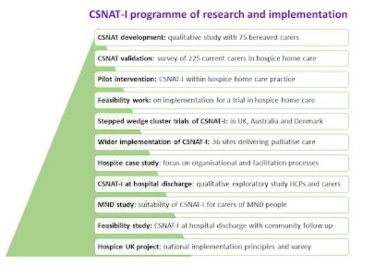When we began our research programme in 2007, we knew carers play a crucial role in supporting patients, that this often affected carers’ own health, and that it was important to assess and address their support needs. However, it was not clear which aspects of support were most important to carers, how their support needs could be identified in a comprehensive, systematic way within everyday practice, and how to ensure support was person centred and tailored to their needs.

Research with carers and practitioners has since taught us what needed to go into CSNAT (the tool itself) to help identify carers’ support needs, how it should be used as a person-centred intervention (CSNAT-I), the benefits of CSNAT-I to carers, and what needs to be in place for successful implementation in practice. The sections below tell you more about each of these topics.

Developing and validating the CSNAT (the tool itself)
To develop the CSNAT (the tool itself) we asked carers to tell us what the important aspects of support were for them when caring for someone with a palliative illness. We first worked with 75 bereaved carers who could reflect back on their whole experience of caregiving. This helped identify a set of 14 key areas of support need (what we refer to as domains).
Ewing G, Grande G, NAHH. Development of a Carer Support Needs Assessment Tool (CSNAT) for end-of-life care practice at home: A qualitative study. Palliative Medicine. 2013; 27(3):244-256.
We validated these domains in a second study which surveyed 225 current carers about their support needs and other aspects of their caregiving experience. This showed the domains to be valid, relevant and comprehensive for end of life care. They became an evidence-based assessment tool for carers during end of life caregiving, the Carer Support Needs Assessment Tool (CSNAT) v2.0.
Ewing G, Brundle C, Payne S, Grande G. The Carer Support Needs Assessment Tool (CSNAT) for Use in Palliative and End-of-life Care at Home: A Validation Study. Journal of Pain and Symptom Management. 2013; 46(3):395-405.
We were then asked if the CSNAT also covered the relevant domains of carer support needs for longer-term conditions. We explored this with 36 carers of people with MND/ ALS. Our colleagues also looked at the needs of carers for people with COPD. We found that the CSNAT worked well for longer-term conditions, but that these carers needed an added domain about the need for support with managing relationships. Consequently, we created a revised version, CSNAT v3.0 with 15 areas of support needs, suitable for all carers of people with chronic and progressive conditions, including cancer.
Ewing G, Croke S, Rowland C, Grande G. Suitability and acceptability of the Carer Support Needs Assessment Tool (CSNAT) for the assessment of carers of people with MND: a qualitative study. BMJ Open 2020;10:e039031. doi:10.1136/ bmjopen-2020-039031
Micklewright K, Farquhar M. Does the carer support needs assessment tool cover the established support needs of carers of patients with chronic obstructive pulmonary disease? A systematic literature search and narrative review. Palliative Medicine 2020, Vol. 34(10) 1305–1315.
Micklewright K, Farquhar M. Face and content validity of the Carer Support Needs Assessment Tool (CSNAT), and feasibility of the CSNAT intervention, for carers of patients with chronic obstructive pulmonary disease. Chronic Illness 2021, online first. DOI: 10.1177/1742395321999433
Developing a person-centred intervention: CSNAT-I
Through further work with services using the tool in practice, it became apparent that to benefit carers, the CSNAT needed to be used within a person-centred intervention which enables carers to consider, express and prioritise their support needs, and discuss these with a practitioner and gain tailored support. Dr Lynn Austin helped to develop what is now known as The CSNAT Intervention (CSNAT-I); a five-stage process of assessment and support for carers.
Ewing G, Austin L, Diffin J, Grande G. Developing a person-centred approach to carer assessment and support. British Journal of Community Nursing. 2015;20(12); 580-584.
Ewing G, Austin L, Grande G. The role of the Carer Support Needs Assessment Tool (CSNAT) in palliative home care: qualitative study of practitioners’ perspectives of its impact and mechanisms of action. Palliative Medicine. 2015;30(4):392-400.
Austin L, Ewing G, Grande G. Factors influencing practitioner adoption of carer-led assessment in palliative homecare: A qualitative study of the use of the Carer Support Needs Assessment Tool (CSNAT). PLoS ONE 2017;12(6): e0179287. https://doi.org/10.1371/journal.pone.0179287
Testing how CSNAT-I benefits carers
Several trials have shown the benefits to carers of using CSNAT-I within palliative care.
An Australian trial found that CSNAT-I led to reduced strain among carers during caregiving. Carers furthermore reported that using the intervention helped them express their needs and gain support, validation, reassurance and empowerment.
Aoun SM, Deas K, Toye C, Ewing G, Grande G, Stajduhar K. Supporting family caregivers to identify their own needs in end of life care: Qualitative findings from a stepped wedge cluster trial. Palliative Medicine. 2015;29(6):508-517.
Aoun SM, Grande G, Howting D, Deas K, Toye C, Troeung L, et al. The Impact of the Carer Support Needs Assessment Tool (CSNAT) in Community Palliative Care Using a Stepped Wedge Cluster Trial. PLoS ONE 2015: 10(4): e0123012. doi:10.1371/journal.pone.0123012
A UK trial found CSNAT-I reduced early grief and improved psychological and physical health post-bereavement.
Grande G, Ewing G, Austin L, O'Leary N, Roberts C. Assessing the impact of a Carer Support Needs Assessment Tool (CSNAT) intervention in palliative home care: a stepped wedge cluster trial. BMJ Supportive & Palliative Care. 2017;7:326-334.
A Danish trial reported that CSNAT-I improved carers’ evaluation of support from practitioners, including attention to their wellbeing, quality of information and communication, and assistance in managing burdens. It also reduced carer distress.
Lund L, Ross L, Petersen MA, Blach A, Rosted E, Bollig G et al. Effect of the Carer Support Needs Assessment Tool intervention (CSNAT-I) in the Danish specialised palliative care setting: a stepped-wedge cluster randomised controlled trial. BMJ Supportive & Palliative Care Epub ahead of print: 20 November, 2020. doi:10.1136/bmjspcare-2020-002467
An Australian trial also showed improved preparedness and reduced strain in carers of older people after discharge from hospital using an adapted version of CSNAT-I for hospital discharge.
Toye C, Parsons R, Slatyer S, Aoun SM, Moorin R, Osseiran-Moisson R, Hill KD. Outcomes for family carers of a nurse-delivered hospital discharge intervention for older people (the Further Enabling Care at Home Program): Single blind randomised controlled trial. Int J Nurs Stud 2016; 64: 32-61
A UK trial of carers of patients with stroke did not find that CSNAT-I made a difference, but found that CSNAT-I was not implemented as intended. This highlights the importance of ensuring the content and process of the intervention are fully understood and implemented in practice.
Darley S, Knowles S, Woodward-Nutt K, Mitchell C, Grande G, Ewing G et al. Challenges implementing a carer support intervention within a national stroke organisation: findings from the process evaluation of the OSCARSS trial. BMJ Open 2021;11:e038129. doi:10.1136/bmjopen-2020-038129.
Understanding successful implementation of CSNAT-I in practice
We realised that we needed to understand how CSNAT-I could be implemented successfully into routine practice across a range of care services. We did this in two ways: through our research studies and by providing CSNAT-I training workshops. We conducted a national implementation study with 36 palliative care services across the UK, and a smaller case study project with Ayrshire Hospice on their implementation experiences.
Diffin J, Ewing G, Harvey G, Grande G. The influence of context and practitioner attitudes on implementation of person-centred assessment and support for family carers within palliative care. Worldviews on Evidence Based Nursing. 2018;15(5):377-385.
Diffin J, Ewing G, Harvey G, Grande G. Facilitating successful implementation of a person-centred intervention to support family carers within palliative care: a qualitative study of the Carer Support Needs Assessment Tool (CSNAT) intervention. BMC Palliative Care 2018;17:129.
We have also provided training and support sessions to over 830 practitioners from a wide range of services. The results from these projects and feedback from the training sessions have since informed the development of our CSNAT-I Training and Implementation Toolkit. Read more about this on the CSNAT-I Training for Practice page.
Consideration of organisational structures and processes is crucial for successful implementation of evidence-based carer support in routine practice. We have developed 10 key organisational recommendations for implementing carer assessment and support in collaboration with Hospice UK. These are based on our implementation research and a large stakeholder consultation project. They provide the building blocks for embedding consistent carer support in any service context.